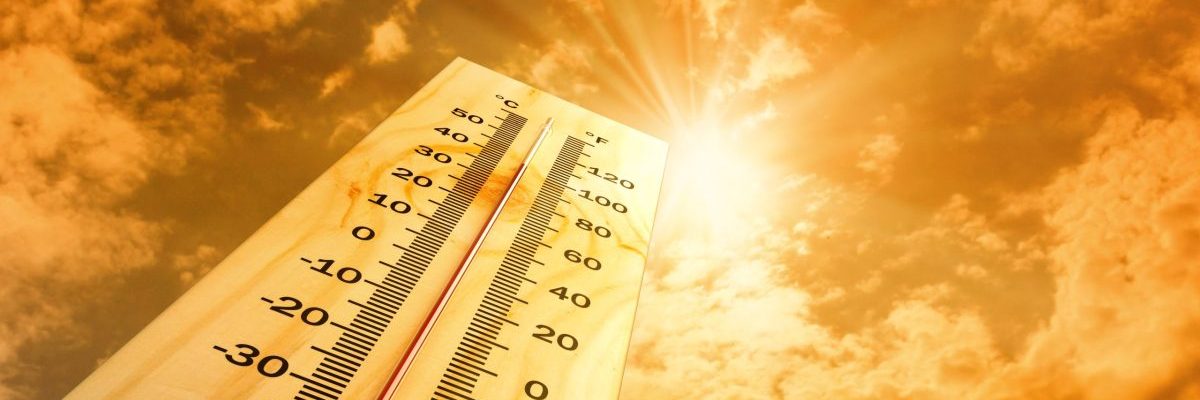Are Heatwaves the New Normal?

Sumanjali Mummana analyses the implications of soaring temperatures across the globe.
Across the globe, heatwaves are growing more prevalent, and violent heatwaves are becoming more frequent. Large swathes of South Asia suffered prolonged and record heatwave conditions in March and April this year. More recently, scorching temperatures have been reported from several European countries, with implications for adaptation strategies.
Extreme heat can increase the probability of other forms of disasters, such as drought and wildfires. Cities too face the urban heat island effect, which occurs when buildings, roads and infrastructure absorb heat, causing temperatures in urban areas to be higher than in outlying places. This effect is greatest during the day, but overnight, the delayed release of heat from infrastructure (or an atmospheric heat island) can keep cities significantly hotter than neighouring places.
CAUSATIVE FACTORS
Our planet is warming. The probability of more extreme hot temperature anomalies increases as average global temperatures rise, resulting in earlier, longer, and more frequent heatwaves. As climate change worsens, disruptions to traditional global atmospheric circulation systems, such as the jet stream in the northern hemisphere, are expected across the globe, leading to more frequent and intense extreme weather events. Smaller temperature differences between the poles and the equator, in particular, can slow the jet stream, resulting in the formation of high- or low-pressure weather systems, leading to more persistent hot-dry extremes in the mid-latitudes. In Pakistan and northern India, the heatwave lasted longer than usual due to a delayed start to the seasonal monsoon. This may become more common in the future as a shifting seasonality of the monsoon is expected with climate change.
IMPLICATIONS FOR LIFE
Heatwaves are now a recurring threat on all inhabited continents, posing an increasing range of threats to human life and well-being, especially in cities where built environments magnify heat exposure. This is significant because by 2050, nearly 70% of the world’s population is expected to live in cities and be subjected to extreme heat. Exposure to heat causes severe symptoms, such as heat exhaustion and heat stroke. Other symptoms include swelling in the lower limbs, heat rash, cramps, headache, irritability, lethargy, and weakness. Heat can also cause severe dehydration, acute cerebrovascular accidents and contribute to formation of blood clots.
People with chronic diseases have a greater risk of developing complications during a heatwave, as do the elderly, the poor, outdoor workers, and people living in cities. For example, in 2003, an estimated 70,000 additional people died in Europe because of a heatwave. The impact of this heatwave in the United Kingdom alone was estimated to be £41 million in health-related costs and productivity. Heat-related mortality is expected to be higher in cities, particularly those with high population densities, inequalities, limited access to health care, high levels of pollution, and fewer green spaces.
ECONOMIC COSTS:
During heatwaves, worker productivity is reduced in a variety of economic sectors, particularly agriculture and construction. The International Labour Organisation, in its 2019 report ‘Working on a Warmer Planet: The Impact of Heat Stress on Labour Productivity and Decent Work’, estimated that globally, 2% of the total working hours are expected to be lost each year, either because it will be too hot to work or because workers must work at a slower pace. It added that heat stress at work is expected to cost $4.2 trillion per year by 2030, increasing inequality. Hotter temperatures are expected to hit the agricultural sector harder, pushing workers, crops and livestock beyond their physiological heat and drought tolerances. This will result in lost labour, in smaller harvests for farmers, higher prices for consumers, and negative impacts on livelihoods. According to a World Bank report, by 2050, climate change could cost India 2.8 percent of the gross domestic product, stalling efforts to lift large segments of the population out of poverty.
ECOLOGICAL IMPACT
Heatwaves without accompanying precipitation increases can cause water shortages and increased stress in plants, particularly in arid regions. This has the effect of reducing plant growth, as well as drying out the landscape overall. These hot and dry conditions are conducive to the start and rapid spread of forest fires. During the 2010 heatwave in Russia – the hottest in 130 years – more than 15 million hectares of forests, vegetation and peat land areas were burnt, and importantly in areas without fire-tolerant species. Heatwaves can also dry up shallow aquatic ecosystems and accelerate glacier melt. For example, the 2003 heatwave resulted in a 10% loss in glacier mass in Europe, which was five times more than the average annual loss.
THE WAY FORWARD
The most effective way to avoid the negative effects of heatwaves is to reduce greenhouse gas emissions (GHG) and limit the rise in global mean temperatures. Shifts toward cleaner energies will reduce not only GHG emissions, but also localised air pollution and urban heat island effects. New initiatives to develop early warning and response systems, as well as improved communication methods, can help save lives and build resilience. Thirdly, during a heatwave, decision-makers can employ a range of strategies and policies such as closing schools or offices that lack adequate air conditioning; ensuring availability of water, health care and first aid; extending access to pools, parks, and public cooling centres; planting trees to provide shade; and pursuing energy efficiency to reduce the demand for electricity.
Finally, improved urban design and sustainable planning that increases the amount of and access to green spaces and other cool environments and encouraging white roofs, will help prevent heat-related illnesses, reduce surface temperatures, and provide a wealth of other nature-related benefits.
No related posts.



